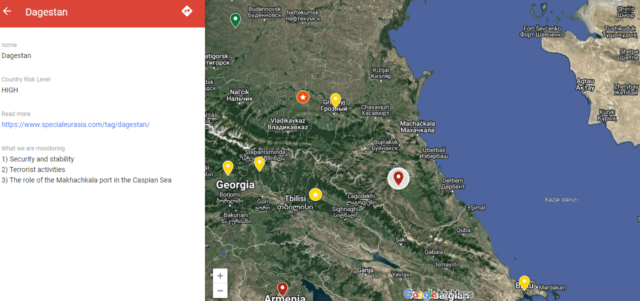
Kavkaz Files ISSN 2975-0474 Volume 13 Issue 1
Author: Silvia Boltuc
Iran and Dagestan have increased their trade exchange through the Makhachkala Commercial Sea Port, where the Kremlin has invested financial funds to transform this infrastructure into a logistic hub in the Caspian Sea, which might undermine the role of the close port of Baku in Azerbaijan.
Alik Abdulgamidov, the Acting General Director of the Makhachkala Commercial Sea Port, stated that the shipment of grain to Iran through the port increased by 25% over the ten months of 2022 and amounted to more than 170 thousand tons. In total, cargo turnover at the commercial port increased by 70% compared to last year’s period. It is noted that since the beginning of the year, the volume of imported goods that the port accepts has more than doubled. In particular, the commercial port processed over 147,000 tons of Iranian cement.
The Makhachkala Commercial Sea Port is Russia’s only non-freezing and deep-water port in the Caspian Sea, which accepts vessels up to 150 m long and with a draft of up to 4.5 m. The port infrastructure includes a dry-cargo harbour with a transhipment complex with a capacity of 3 million tons per year, cargo and containers with a total of up to 1.2 million tons per year, a railway and car ferry terminal with a capacity of 1.3 million tons, a grain terminal with a capacity of 0.5 million tons per year.
Geopolitical Risk Scenario
In April 2022, an Iranian delegation headed by the general director of Daryadelan LLC, Hadad Yahya Mehdi, met with the Makhachkala Commercial Sea Port representatives. During the business meeting, the Iranian side stressed that Makhachkala could profoundly contribute to developing relations between Russia and Iran.
The Dagestani port is part of the International North-South Transport Corridor (INSTC), which provides a route from Indian goods to Russian and European markets. Moreover, Russia has recently shown interest in replacing European goods with Iranian ones due to the sanctions imposed on Moscow after the Ukrainian crisis.
In recent years, Moscow has invested financial and human resources to improve the Makhachkala Commercial Sea Port. According to the Russian socioeconomic strategy in the North Caucasus, Makhachkala might become a logistic hub in the Caspian Sea, connecting the Russian Federation with Iran, the Central Asian republics, and the Belt and Road Initiative.
The rise of Makhachkala threatens the nearby city of Baku, the capital of the Republic of Azerbaijan, where the local authorities have invested vast amounts of monetary funds in developing the city port and the local infrastructures to transform Baku and the entire Azerbaijan in the Eurasian logistic hub.
Furthermore, the Caspian Sea is the epicentre of several energy pipelines and projects which link Central Asian and Caucasian oil and gas fields to Europe. In the face of the EU – Russia confrontation, due to the Ukraine conflict and the Western sanctions against Moscow, and the EU Energy Security Strategy to decrease Brussels’ dependence on Russian energy exports, if the Russian Federation can improve the activities and centrality of the port of Makhachkala overshadowing the near Azerbaijan, this infrastructure might impact Brussels’ natural gas diversification strategy and trade exchange in the Eurasian chessboard.
The rising role of Makhachkala Commercial Sea Port confirms the Kremlin’s attention and desire to improve the connection between Dagestan, and the entire North Caucasus, with regional markets in the Caspian Sea area, the Middle East, and Central Asia. Indeed, recently, the Kremlin organised a special event to promote the Dagestani culture in the Southern Federal District, while in October, the Stavropol Territory hosted the forum “Severnyj Kavkaz v menjajushhemsja mire”, which attracted political representatives, entrepreneurs and companies from the Middle East and Africa.
Do you like SpecialEurasia reports and analyses? Has our groundbreaking research empowered you or your team? Now is your chance to be a part of our mission! Join us in advancing independent reporting and unlocking the secrets of Eurasia’s complex geopolitical landscape. Whether through a one-time contribution or a monthly/yearly donation, your support will fuel our relentless pursuit of knowledge and understanding. Together, let’s pave the way for a brighter future. DONATE NOW and secure your place in shaping the geopolitical narrative.



